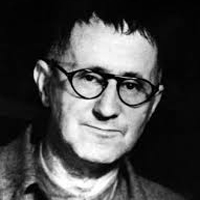Spirit of Science and Galileo in Brecht's Galileo
Brecht dramatizes the conflict between Science and religion, Creative doubt and Christian faith, Free thought and bigotry, and the induction and deduction. He not only dramatizes the conflict, but also its hindering consequences. Brecht demonstrated how the dogmatic Inquisition and the Ptolemaic-Aristotelian world view forced science to move in the direction of extinction.

Bertolt Brecht (1898-1956)
Galileo had discovered that the earth is not the center of the universe. This discovery of Galileo became a living proof of the fact that Ptolemy is wrong. Galileo found out that the celestial bodies are not as perfect and spotless as Aristotle had supposed. This second findings put a slap on the face of Aristotle. One after another Galileo propounded scientific findings, all those findings were practically proven. There was every reason to believe that Galileo's findings were, doubtless, correct what was acquired as a mode of knowledge through the medium of the telescope was testable and practically true. Galileo put forward a beautiful bunch of radical and golden scientific ideas. But those scientific truths were unpalatable to the Inquisition, the organized center of superstition. Under the banner of the faith's sovereignty the Inquisition invaded the autonomous territory of science. Under the impression that Galileo's theories ruined the sacred temple of Christian faith, the Inquisition forced Galileo to face either severe corporal punishment or to recant his theories. Frightened of the physical punishment, Galileo recanted. When the public heard that Galileo recanted, people suddenly grown belief in the miracle of science dwindled down to nothing. The prospect of the emergence of the scientific enlightenment was doomed to extinction owing to Galileo's recantation.
Thus, the play Galileo dramatizes how the Christian superstition defeated the progressive march of science. It also does not hesitate to display that as a result of the battle between science and religion, science was defeated, but the scientists were not. Even after the time of recantation Galileo continued to get involved in scientific research. He had hoped that in future there may come another courageous scientist who help science to flourish. With this hope in his heart, Galileo gave continuity to his scientific research.
It is Galileo Galilee who sowed the seed of science, though this seed failed to germinate and take root because of his timidity. Had he not sown the seed of science, later scientists might have to work hard to locate the space of science. The real scientific spirit was embodied in Galileo. But this scientific spirit failed to obtain the actual level of its concrete manifestation. Both the character of Galileo and the spirit of science found their joint manifestation in the text of Galileo. It is explicitly noticeable that at the heart of the play Galileo lays the manifestation of the spirit of science and the character of Galileo.
Had the play intended to manifest the character of Galileo, it should not have incorporated the event of Galileo's violent interrogation in the Inquisition. The Intuition interrogated Galileo formidably. The purpose of the Inquisition in interrogating Galileo was not to modify the character of Galilea but to subdue the spirit of science. The politics of interrogating Galileo in the Inquisition are the politics of extinguishing the burning flame of science. Hence the ultimate goal of the play Galileo is to project how the spirit of science was dampened by the rigorous politics of the Christian Inquisition.
By the same token, the play Galileo aims at representing the character of the seventeenth century scientist Galileo. Brecht represented Galileo as a genius tainted with scars of idiosyncrasies. When we see Galileo's limitless hunger for old wine and new thought, we could not help thinking that there were certainly some signs of abnormalities in his personality. When we find him doing scientific research even in old age we could not help appreciating the mark of his scientific prodigy. When we find him recanting for fear of physical punishment, we hate him for his timidity.
Galileo Study Center
Introduction of Brecht's Galileo
Dramatic Irony in Brecht's Galileo
Significance of Telescope in Brecht's Galileo
Brecht's Dramatic Technique in Galileo
Conflict between Faith and Doubt in Galileo
Elements of Experimental Modernism in Galileo
Marxist Standpoint of Brecht in Galileo
 |
bachelorandmaster.com |